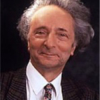Theodore Zeldin

Theodore Zeldin
Theodore Zeldinis an Oxford scholar and thinker whose books have searched for answers to three questions. Where can a person look to find more inspiring ways of spending each day and each year? What ambitions remain unexplored, beyond happiness, prosperity, faith, love, technology or therapy? What role could there be for individuals with independent minds, or who feel isolated or different, or misfits? Each of Zeldin’s books illuminates from a different angle what people can do today that they...
NationalityEnglish
ProfessionPhilosopher
Date of Birth22 August 1933
Change the way you think, and you are halfway to changing the world.
The violent have been victorious for most of history because they kindled the fear with which everyone is born.
The British have turned their sense of humour into a national virtue. It is odd, because through much of history, humour has been considered cheap, and laughter something for the lower orders. But British aristocrats didn't care a damn about what people thought of them, so they made humour acceptable.
The kind of conversation I like is one in which you are prepared to emerge a slightly different person.
The Renaissance… was based on a new idea of the importance of the individual. But this was a fragile foundation, because individuals depended on constant applause and admiration to sustain them. There is a shortage of applause in the world, and there is not enough respect to go around.
When will we make the same breakthroughs in the way we treat each other as we have made in technology?
All invention and progress comes from finding a link between two ideas that have never met.
We should abolish 'work.' By that I mean abolishing the distinction between work and leisure, one of the greatest mistakes of the last century, one that enables employers to keep workers in lousy jobs by granting them some leisure time.
Forks and spoons have probably done more to reconcile people who cannot agree than guns and bombs ever did
I think the hero in our generation is not the individual but the pair, two people who together add up to more than they are apart.
Conversation is a meeting of minds with different memories and habits. When minds meet, they don't just exchange facts: they transform them, reshape them, draw different implications from them, engage in new trains of thought. Conversation doesn't just reshuffle the cards: it creates new cards.
A dream is what makes people love life even when it is painful.
Art is, nowadays, our new religion and museums are our cathedrals.
The brain is full of lonely ideas, begging you to make some sense of them, to recognize them as interesting. The lazy brain just files them away in old pigeonholes, like a bureaucrat who wants an easy life. The lively brain picks and chooses and creates new works of art out of ideas.